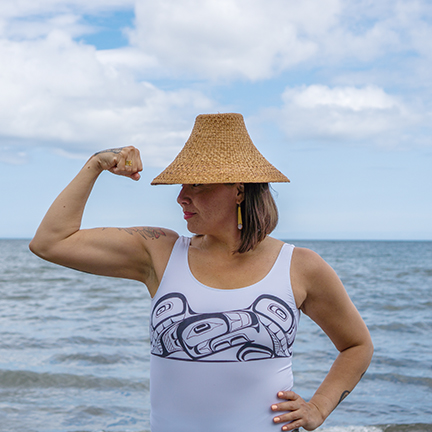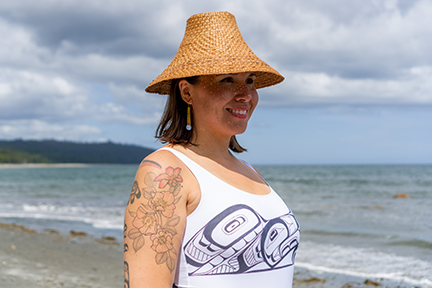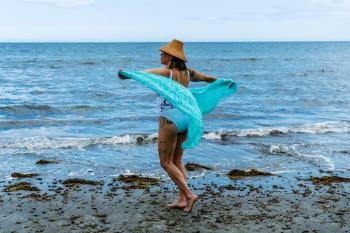Image Caption
Summary
Local Journalism Initiative Reporter
Windspeaker.com
Jasḵwaan, Amanda Bedard, is a competitive swimmer representing Haida Gwaii. She will be competing in the European Masters Games July 7 to July 9 in Tampere, Finland.
It’s a personally empowering challenge, while representing her nation on a world stage, Jasḵwaan says.
“I'm basing it on this sense of strength that's just within me,” Jasḵwaan explains. There is no swimming pool on Haida Gwaii for training, which means “I am the least prepared I have been for any competition, ever. I am relying on muscle memory and the fuel of focused rage and passion for the things that make me, me.”
Jasḵwaan is of the Tsiits Git'anee Eagle Clan, Haida Gwaii. She introduces herself through her Haida matriarchs, Emma Matthews and Phyllis Bedard. She’s a mother, Xaad Kil (Haida language) teacher, researcher and Ph.D. student, who has been swimming competitively for 36 years.
For this competition, she’s returning to a city she visited 20 years ago. She had presented a a paper there on Haida observations of climate change at a conference of Indigenous researchers and scientists. That early work grew into, and continues with the organization, Snowchange.
The swimming seed was planted early in Jasḵwaan’s life, as she illustrates with a story of when she was just one year old.
“I was walking along the Yáaguun G̱ándlee (Yakoun River), which is an important river on our island here. I had just learned to walk, and I had fallen into the river.”
When her older cousin called her mother and auntie, who came racing, “I was just floating, and I was completely fine,” she laughs gently. “I think about that a lot, because I’m always called to the water.” She was competing by age eight.
For Jasḵwaan, swimming has been a life path, along with being a language worker for the past 20 years.
“Language work is difficult work, because there's lots of issues around language revitalization that include a lot of healing and pain,” she said.
The work is not just about knowledge transfer, it's also a healing process that's not easy, and not linear. She shares an example from her father, Kwiiyaans Ken Bedard, who went to Indian day school.
He still held genealogies and cultural knowledge, but “sometimes he'd try and say some things and they'd be stuck in his throat almost.” As an empathetic person, “I could feel it.”
“I've worked so many years with Elders, and most of them are gone now,” she said. “I would take on this emotional weight that went along with learning.”
Jasḵwaan also carried the weight of knowing Elders were “giving what they could for us learners. And the toll it took on them.”
Our collective goal is to ensure that the people that come after us don't have to go through those same difficulties,” she explained.

“I'm always gathering strength from the water,” said Jasḵwaan, “It is really tied to my language work because it kind of gives me this outlet to pour all this energy. That doesn't really have many other places to go. I often go to the ocean to help me deal with the difficult work of language teaching and learning and revitalizing.”
After the birth of her third child in 2012, there was a period of time where she “was struggling, feeling all of that, and I didn't know what to turn to to help me. I remembered feeling so strong swimming and competing, so I focused my energy to go to a master's competition in Vancouver.”
She made a goal for herself to compete in one master’s event per year, despite having no pool to train in. Although COVID interrupted that rhythm, Jasḵwaan feels strong going into the competition in Finland.
Jasḵwaan is grateful for her mother Kunaajaat Kathy Bedard and father Kwiiyaans “who gave me such a beautiful upbringing that I was able to focus on my sport and also my academics. I know how lucky I am. And, I want that for all of our communities, for children to have those opportunities, to have the space and support.”
Jasḵwaan is thinking of the youth of today and the youth to come when she reflects on the lack of a recreation centre on Haida Gwaii. Youth should have access to facilities if they want to pursue swimming, basketball, hockey, or other activities, she said.
The closest pool is an eight-hour ferry trip. When she was living in Kx̱een (Prince Rupert) growing up, or later in cities completing university degrees, she had access to pools for the hundreds of hours of training required. When she returned home to Haida Gwaii to raise her children and work with her community, she began relying on “dryland training.”
While athletic swimmers do supplement pool hours with this type of training, it’s rare for a swimmer to only have dryland training. The reality of cold water ocean swimming is that she can’t do the kilometres of training required in the ocean.
”And, you know, for all of the richness of Haida Gwaii, the fact that we don't have a rec center is not right.”
“There’s probably been billions and billions and billions of dollars taken from these lands through forestry and fisheries. And that there's nothing to show for that here in terms of that kind of infrastructure, that is on my chest.”
That carried her to her first major competition in Montreal in 2014.
“I wanted that message out there. ‘I can compete at this world competition without a pool. Imagine what we could do with one’?”
Jasḵwaan reflects on Haida stories of the undersea world, the killer whale village with killer whale people and the chief of the sea.
“The roles these ocean beings play in our stories, because this transformation aspect of our supernatural history, is really prominent.”

“I'm drawn to the water and a lot of my strength is from my ancestors. I think about that often and I'm grateful for it because the narrative of Canada, always impressing on us that we have this inherited trauma, which I know is true and I struggle with that, but I do remember this inherited incredible strength.”
“I feel that's why I'm drawn to continue this healing through the ocean so I can continue to do my language work. I feel like I'm being guided by my ancestors.”
Local Journalism Initiative Reporters are supported by a financial contribution made by the Government of Canada.

